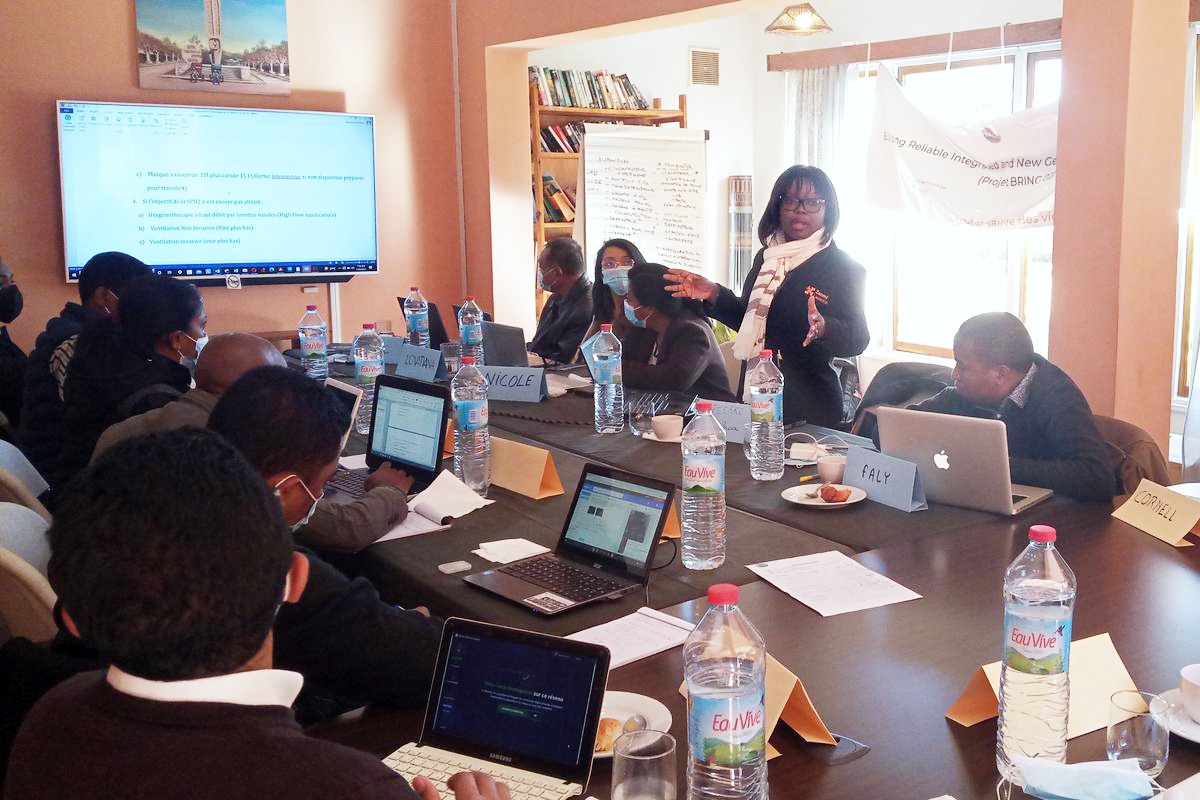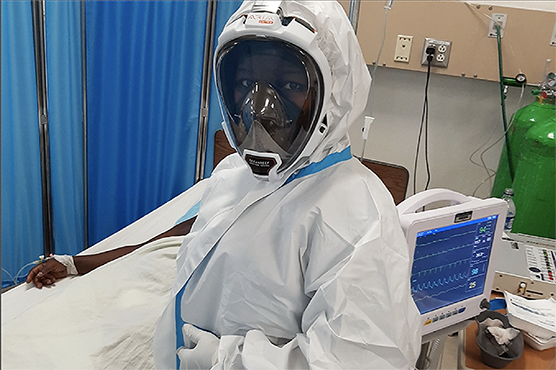ICU Director Shares 'Singular, World Class Skills' Across Haiti and Beyond
Zanmi Lasante physician raises standards for crucial oxygen delivery to patients
Posted on Nov 7, 2022

To truly understand Dr. Benoucheca Pierre, it’s worth recounting her recent travels to Madagascar, where she lead physicians creating new national standards for delivering medical oxygen to patients.
In July, Pierre, chief of the ICU at Hôpital Universitaire de Mirebalais, couldn’t fly out of Haiti, where she was born and lives, because all direct flights to Europe had been canceled in the wake of an escalating security crisis marked by nationwide violence and fuel shortages.
So, she drove about six hours to the Dominican Republic, boarded a plane to Paris, waited 12 hours and then continued on to Mauritius. But because her COVID-19 test had expired prior to her final flight to Madagascar, Pierre was prohibited from boarding. And, without a local hotel reservation, she was detained in immigration. After several hours of fraught calls, Pierre was able to book a hotel and secure a flight that connected to Madagascar through Reunion Island, which sits in the Indian Ocean as a department, or region, of France. Holding a French visa, Pierre assumed there would be no problem traveling this route. However, officials told her that her French visa was unacceptable, and she would have to wait for a direct flight the next day.
“So, 48 hours after she finally lands, she leads the workshop,” said Dr. Paul Sonenthal, an associate physician in the division of pulmonary and critical care medicine at Brigham and Women’s Hospital in Boston and director of inpatient medicine and critical care for Partners In Health. “There was never a moment where she said, ‘Maybe I shouldn’t do this.’"
He added: “I have the deepest respect and admiration for her commitment,”
‘I Am a Doctor’
The daughter of an artist and salesman, Pierre grew up in Port-au-Prince where she attended high school and worked at her local church. “I wanted to be a doctor because I worked with the kids at church, and I was very interested in keeping them healthy,” she said. Following her medical studies at Notre Dame University, Pierre received a prestigious fellowship in France, training in anesthesiology and critical care. But rather than accept a lucrative position in Europe, Pierre returned home to Haiti, specifically to Hôpital Universitaire de Mirebalais, the teaching hospital run by Haiti’s Ministry of Health and Zanmi Lasante, as Partners In Health is known in Haiti. There, she said, “I could continue my learning in intensive care.”
Indeed, Pierre not only continued learning; she became the chief of the unit and, in the country’s public sector, the only ICU-trained doctor in Haiti. She remains one of only two intensivists in the country. “She has a singular and unique set of world class skills and expertise that she is sharing with the nation,” Sonenthal added.
Even before the pandemic hit, he said, Pierre was busy directing the planning and establishment of the country’s first COVID-19 treatment unit at HUM. When ill patients began arriving with the virus, and other doctors feared coming into the clinic, Pierre did not hesitate and remained on call essentially 24/7, said her colleague, Dr. Christophe Millien, chief medical officer at HUM.
“She said, ‘I am a doctor. It is my responsibility to take care of patients,’” Millien said.
Sharing Oxygen Expertise
At that point, there was a dearth of knowledge or standards on effective oxygen administration in Haiti, Sonenthal said. There were no protocols in place that detailed the correct amount of oxygen given in certain cases, or whether it was best to use a nasal cannula, face mask, or breathing tube, he said. That’s when Pierre took charge, recognizing an opportunity to build the hospital’s critical care capacity.
“She essentially developed all the protocols for oxygen therapy for COVID-19 patients at HUM and then took that to the national level throughout Haiti,” he said, adding that in less than a year, Pierre’s physicians “were fully capable of independently managing patients on ventilators, adjusting settings and sedation to ensure the provision of lung protective ventilation.” Then, she expanded the curriculum nationwide, he said, training dozens more clinicians, while continuing to oversee care for patients at HUM.
Now, Pierre is spreading her oxygen expertise into other regions as a senior expert advisor in Madagascar for BRING O2 a Partners In Health-led initiative to increase access to safe, reliable medical oxygen in five countries—Malawi, Rwanda, Peru, Lesotho, and Madagascar. The effort is funded by Unitaid, in partnership with Build Health International and PIVOT Health Madagascar.
Pierre’s job is to support the medical professionals in Madagascar, where there had been no standard oxygen guidelines; to develop national oxygen protocols, and to advise professional training
An Unsung Hero
Pierre’s efforts have led her to be nominated for an “Unsung Hero” award from the organization Reaching the Last Mile. In his nomination, Sonenthal wrote:
“She has remained committed to these activities despite the rising level of insecurity in Haiti. For extended periods, when the commute from home became too dangerous, Dr. Pierre has opted to live within HUM’s grounds so she could continue to serve her patients.”
Millien noted Pierre’s ability to both teach and mentor other physicians while also delivering top-notch, compassionate care for patients and saving countless lives.
Sonenthal recalls one of Pierre’s patients, a 20-year-old who’d had a severe asthma attack and needed to be placed on a ventilator. “The odds of him surviving in a U.S. ER were 50/50,” Sonenthal said. He and Pierre consulted back and forth for days and into the night as the patient’s condition fluctuated, from stable to being on the “brink of death,” with airways so narrow that too much outside oxygen pressure could blow out a lung and prove fatal.
Due to Pierre’s “quick response and recognition” of the patient’s condition and her “subtle, elegant” shifts on the ventilator, he survived.

Pierre said she often keeps in touch with her patients. She remembers a recent case, a man who had to be intubated: “I remember he told me, ‘Doctor you are going to make me sleep and not wake up, and I am the only one working in my family, I am the only provider,’” she said. “I told him we would give him the very best care. He was a very big challenge, intubated for two weeks. Then when he was discharged, we celebrated with the family.”
Pierre continues to face dire conditions in Haiti, most recently an oxygen shortage with one of the main hospitals reporting limited supply and patients at risk.
“All the main health structures of the country are on alert, such as the General Hospital, because they depend on external oxygen supplies, ” Pierre said. “At the University Hospital of Mirebalais, we have two oxygen generators on site that completely fill our need for oxygen for the good of our patients. The second one, not yet operational, was donated by the Ministry of Public Health in the midst of the fight against COVID-19....So in the last few weeks we have been more affected by the fuel shortage as we are struggling to provide continuous power to the hospital and our sites.”
Her ability to persevere through such difficulties is unique, colleagues said. Pierre’s grueling trip to Madagascar is an “illustration of the complex barriers she faces,” according to Sonenthal. “It was not easy for her to get there, there were so many barriers, but she persisted, she never wavered. She is my greatest clinical hero.”

